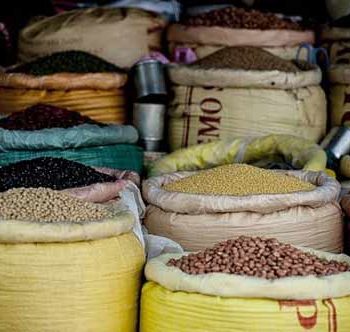This post contains affiliate links, which means I may earn some money if you click on one. Don't worry, there is no additional cost to you. Thank you for supporting my blog.
These past few weeks, the weather has been horrendous. I am usually a very picky food shopper, but the poor conditions have prevented me from shopping at the usual stores. (The icy roads have prevented me from traveling very far). It has been a painful reminder of why I need to stock up on food. My “pantry” right now is frightfully low on supplies.
Consumers Want Healthier Choices
The organic selection at the local grocery store is somewhat sad. (I bought an organic avocado last week which looked pretty nasty when I opened it up). Last night I bought a mixture of organic/non-organic vegetables, (following the dirty dozen/clean thirteen rules). When I was checking out, I had a conversation with the employee ringing up the groceries about organic food. It was very encouraging to find out that someone working at a grocery store, who most likely does not have a high wage, shops at the same “farm store” I do, and understands the importance of good quality food. It reminded me of something that comes to mind any time I get frustrated with the cost and inconvenience of sourcing good quality food.
It’s not always easy, sticking to your standards. It makes eating out difficult, grocery shopping more complicated, (good stores have weird hours), and it is expensive. But it is important. Good quality food should be the standard not the exception. If we rely on the government to improve the quality of our food, we will be waiting a long time. (Too many lobbyists and special interest groups influence government policy). If we want good quality food, WE have to be the change. We have to vote with our dollars, our choices. It might not seem like much, but if we all do it, the change will happen.
So here is why I buy mostly organic food ….
1. I don’t want to eat toxins.
I don’t want my family to eat toxins. The world is toxic enough. Everything is toxic, or so it seems. I don’t have much control over what is put in the air, water, or ground. I do have control over what I purchase and put in my shopping cart. If someone took a can of Roundup and sprayed an apple and handed it to you, would you eat it? What if they washed it off first, would you eat it? Would you give it to your kids? When I think about it in these simple terms, the importance of eating “pesticide free” food is very clear.
2. I don’t trust GMO food.
Now, for clarification, it is “transgenetically modified food” that concerns me. When I eat an apple, I just want it to be an apple. I don’t want DNA spliced into it from a fish, worm, cow, person, etc. I just want it to be an apple. I have heard the argument that all food has been genetically modified, which is sort of true, but very misleading. There is a big difference between mixing DNA from different species and selecting for traits within the same species.
There are natural barriers that prevent DNA from different species mixing. (There are exceptions with lower organisms, such as bacteria, such as horizontal gene transfer, but most species cannot successfully reproduce with other species). Now, it is possible that GMO food is safe and there is nothing to be concerned about. The problem is, as consumers, we just DON’T KNOW. The long term safety studies have simply not been done yet, so essentially we are part of a large scientific experiment right now. I prefer to error on the side of caution and avoid foods that have not been properly tested for safety.
3. Glyphosate – is “probably” a carcinogen. (source).
Glyphosate, the active ingredient in Roundup, is also used as a dessicant to make harvesting wheat easier. (source) So basically, wheat products are contaminated with this herbicide when harvested. I have seen articles that try to dispute this practice, claiming the use of this practice is exaggerated, but recent testing on food products has shown high levels of glyphosate contamination. (source). The LD 50 data, (toxicity studies) shows Roundup is “safe”. However, those studies do not include data for bacteria.
Our gut microbiome is important, and scientists are just beginning to understand the role it plays in our health. Nothing is ever “settled” in science, it is always changing with the availability of new data. Glyphosate negatively affects the shikimate pathway in bacteria. (source). Though humans do not have this pathway, our gut bacteria do. Glyphosate, (Roundup), might harm our gut bacteria, which we NEED for digestion and our immune system.
I work very hard to keep my gut bacteria happy and healthy, and glyphosate is a herbicide I try to avoid. (Again, the science is not settled on this yet, but I prefer to error on the side of caution).
Tropical Traditions
(It is difficult to avoid completely, even organic food is contaminated. But at least I am reducing my exposure and I do believe every little bit counts. Tropical Traditions is one company that regularly tests for glyphosate. They are expensive, but if you subscribe to their newsletter you will be alerted when they have sales. For Thanksgiving, I purchased an organic turkey for 50% off).
4. I like supporting small and local farmers.
I understand not all small farmers grow organically, and there is an expense to being “certified organic”. Some farmers do not use pesticides but have not gotten their certification. That is why it is important to know your farmer and ask questions. At the farmer’s market I always ask if the corn is GMO and if they use Roundup. I was able to find a CSA that is certified organic, so it is nice to have a source of produce I can fully trust. In the summer I dehydrate and freeze food I obtained from my CSA which saves money and ensures I have good quality food. I have also found a small farm that supplies organic food. So it is possible to find local farmers who grow organically. You have to look for them. Truthfully, it is not always convenient. (The farm store has weird hours and I have to drive to a pick-up location once a week to pick up my CSA box). But it is important to make the effort to “vote with our dollars”.
How To Reduce the Cost of Organic Food
1. Eating organic food IS more EXPENSIVE. I am always looking for ways to reduce the cost to our family. Here are a few solutions I have found.
2. Growing our own food. (We live in an apartment and do not have a yard, but we joined a community garden).
3. Buy in season and freeze/dehydrate food.
4. Shop at local farmer’s market.
5. We joined Thrive Market, which has produced savings for our family. (I have read mixed reviews on this food club online. I think it depends on what you buy. We save a great deal of money on staples like ghee and coconut oil)
6. Meal planning. (I am still working on this one, but there is less waste if you plan your meals)
7. When organic food is not available, or in short supply, I use the dirty dozen rules, (and a little common sense).
8. If it is leafy green I always buy organic. If it has a thick skin, it typically does not have to be organic. (Most squashes fit in this category).
How To Avoid GMOs
To avoid GMOS with fresh produce you need to know which foods have been genetically modified. This is changing all the time. (I think a genetically modified pineapple is going to be released soon). Currently buying organic pineapple is not a priority because of the thick skin. But that could change very soon.
To avoid GMOS with packaged goods, it usually needs to be organic. Why? Most packaged goods have wheat, corn, soy, or sugar in it. They are all TRANS genetically modified unless indicated otherwise, (or organic).
There are a lot of misleading labels too. “All Natural” often means nothing. GMO free foods often contain foods that are laced with pesticides, and my all time favorite is the “gluten-free” labels. Gluten-free does not mean healthy. There are so many marketing tricks that are used with food labels. It is overwhelming at first.
My advice is to start small, make the changes a little bit at a time. If you eat rice cereal, look for cereal that has rice and honey under ingredients. If you buy almonds, look for packaging that only has ALMONDS. (Most nuts have coatings that have soybean oil). Try to buy more “real food” and not packaged food.
It’s not EASY, but it is WORTH it.
There is a saying, pay the farmer or pay the doctor. I prefer to pay the farmer and live a healthy life. But try to find balance, (this is something I struggle with). In this country it is very challenging to eat healthy. Do the best that you can and let go of the rest. Stress is toxic too. If we all make changes, no matter how small, we are one step closer to having better quality food and better health.
Do you buy organic food? Why or why not?






No Comments